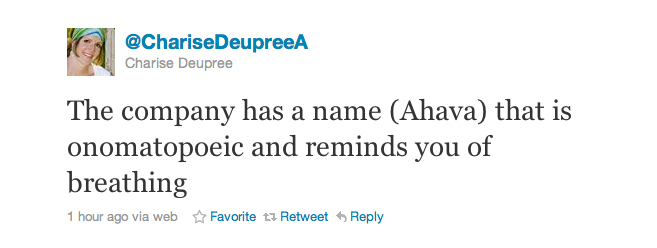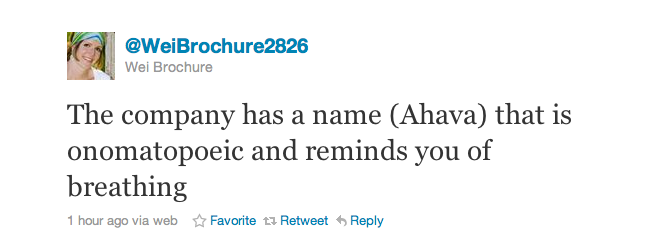On April 18, Anas Qtiesh wrote about spambots targeting the #Syria hashtag in an effort to drown out speech calling for, or reporting on, protests. While this specific case has received an abundance of attention, on Al Jazeera, Fast Company, and elsewhere, it is representative of a larger problem on social networks: the use of automated accounts, or bots, targeting a search term in an effort to silence a certain type of speech.
But why does this matter? As many have pointed out, there's no censorship here; users are not seeing their content removed. The problem is that observers and journalists alike have come to rely on Twitter's search function to find information about a subject, and when a search term is targeted by automated content, valuable information–such as that about a protest–gets drowned out.
This morning I was alerted to another example: “Ahava spambots.” Ahava, an Israeli company that relies on resources in the Occupied West Bank, is the target of numerous boycott campaigns. On Twitter, accounts like @BoycottAhava share news and information about the boycott, sending tweets manually. In what appears to be an effort to drown out information about the boycott, numerous spambots have sprung up in recent days, tweeting the same statements repeatedly across multiple accounts, sometimes using the same avatar:
We have tracked numerous instances of this same tweet across various accounts, including:
@SaraiHellard489
@ChariseDeupreeA
@WeiBrochure2826
@CordiaPeed5221
@SaraiHellard489
@ElainaArslanian
It has become clear that targeting a search term or hashtag is an easy and sometimes effective way to drown out important speech. And while Twitter is typically responsive, removing automated accounts from search or deleting obvious spam accounts such as those shown above, if this is truly an emerging tactic, there's a considerable risk that Twitter will not be able to keep up with the bots; one solution might be for Twitter to set into motion a new mechanism for reporting instances of such tactics. In the meantime, users should take care to discern genuine speech from the tactics of spammers.






17 comments
Governments are getting “creative” in their censorship efforts. But people will get more creative, truth will emerge eventually.
Michael, its the ‘eventually’ that is the issue. sometimes (particularly with Twitter) – its meant to be *timely*.
New form of spam. I wonder if we (or Twitter) will have to employ anti-spam engines to remove posts. I wonder if they’ll have a 1%+ false positive rate (like anti-spam does so many times do with email).
Finally, I wonder if Twitter will be damaged in the way that email has – but only quicker, faster – as spammers are now an unfortunate, unwanted force to be reckoned with.
When a story first breaks, follow the relevant hashtags at first but identify and follow reliable specific accounts as quickly as possible. Ideally, you’re no longer hashtag-dependent before the spam sets in.
Strictly speaking, this contradicts excellent advice for protecting sources by NOT following them. A workaround is to “stalk” an account by just searching for its name every time without ever officially following it. (I’m sure there’s already an established name besides “stalk” that I’m just not hip enough to know; if so, my apologies.)
A big caveat is to type carefully and beware of spoofs. A relevant example from Bahrain is a dummy account called “angryarabyia” (note the transposed Y and I) which trolls would-be followers of protester Zainab al-Khawaja (aka angryarabiya), down to using the same avatar and extended profile name while taking an ideologically opposite view.
With the word ‘ahava’ meaning ‘love’ in Hebrew, with it being the name of an anti-human trafficking organization (ahavakids.org), the name of a dance instructor (ahavadance.com) and the name of a spa (ahavaspa.com), I can’t figure out why, with Ahava the skincare company’s own marketing related tweets being drowned out with everything else, it’s assumed that these “twitter spambots” are somehow related to the Israeli company?
When i get rid of this shit of spamm. am tired of this. makes my blogs slow down